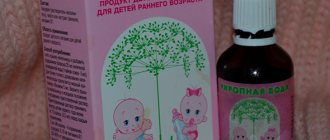Dill water is a natural solution that relieves newborn babies from intestinal colic. No garden plant is used for its preparation; it contains one percent fennel oil and distilled water . The fruits of pharmaceutical dill are safe for a fragile body, so it is recommended to brew them and consume them on the tenth day after birth.
Dill water has a wide range of actions : it is used to relieve colic in the intestines, create beneficial microflora in the body, prevent constipation and develop appetite. It is important to remember that the product has an extremely limited shelf life. Up to one month of life, children should prepare new water for each dose. In the second month of care, you need to learn a number of simple storage rules, which will be discussed below.
special instructions
Since dill water is quite difficult to find in pharmacies, it can also be prepared at home.
The main component of the medicine is fennel, or dill, and it can be purchased in pharmacies under the name “Fennel fruit”.
You need to take 1 teaspoon of fennel fruit (heaped) and pour 250-300 ml of boiling water, cover tightly with a lid and let simmer for a minute. Leave for half an hour and express. It turns out natural homemade dill water. It is recommended to prepare it daily so that the child receives only fresh medicine. It should be remembered that the infusion should be prepared using fennel fruits, not dill.
Today, this drug is a proven, effective and most inexpensive drug for colic.
What factors influence storage
Maintaining the quality of the medicinal solution is of paramount importance for both the mother and her baby. If stored improperly, there is a decrease in the effectiveness of the drug and even its obvious harm. To prevent such losses, you need to create the most favorable conditions, such as:
- Air humidity.
- Lighting and air composition.
- Container and proper packaging.
Dill water should not be stored in a place that is too dry or cold. Otherwise, it will dry out or freeze. Freezing dill water is prohibited . After these processes, the water will be unfit for consumption. The optimal storage temperature is no more than 25°C . Low temperature creates a kind of barrier for the development of bacteria, and when it increases, the degree of evaporation of moisture from the concentrate increases.
Illumination and air composition also have a great influence on the safety of dill water. Solutions under the influence of sunlight change color and chemical composition, so it is worth protecting the drug from direct sunlight.
Clean sealed packaging protects water from excessive evaporation of moisture and the proliferation of harmful microorganisms. The container must have a lid, be tight, dry and heat-resistant. It is better to give preference to glass or specialized dishes for newborns.
How to properly give dill water to a newborn?
There are two ways to use dill water:
- Give 2-3 teaspoons 3-4 times a day between feedings. To avoid side effects, start with half a teaspoon.
- You can dilute the infusion in boiled water and give it to drink from a bottle throughout the day. Shake the bottle before use.
But don’t forget, no matter what age you start giving dill water, start with a small dose to assess the child’s reaction. This way you will be sure that you will not harm the baby.
Most often, kids like the sweetish and aromatic drink, and they drink it with pleasure.
In what cases does a baby need dill water?
The exact cause of colic in children has not yet been established, nor has a proven medicine been found to help eliminate it safely for babies. The prevailing theory today considers the immaturity of the child's intestines to be the cause of the problem.
After birth, the baby’s intestines are absolutely sterile, so with the first sip of mother’s milk, the process of colonizing it with beneficial microflora begins. Without it, it is very difficult for a baby to digest food, and the intestines themselves still “do not know how” to work correctly. Therefore, from 1 to 3-4 months, most children experience colic - bloating and increased gas production.
Since there have been no serious studies on the effectiveness of medications for colic, doctors often prescribe several medications, asking parents to independently choose what will help best. However, adding a mountain of tablets or powders to a fragile intestine, unable to properly cope even with mother’s milk, is not the best way to make its work easier. It is much better to resort to safer herbal remedies.
Dill water for newborns is a long-proven remedy that can eliminate painful gases and help them improve the digestion process. It is prepared either from ordinary dill, or (which happens more often) from “wild dill” - fennel. But not from leaves, but from seeds or essential oil. In any variant, the product has a solid set of healing properties, while dill water for colic has virtually no side effects.
How to give dill water for newborns
» Miscellaneous articles » How to give dill water for newborns
The first months of a child’s life are a difficult test not only for parents, but also for his own body.
At this time, adaptation to the changed living conditions of all organs and systems of the newborn, including the digestive system, occurs.
The most painful manifestations of the resulting imbalance are colic - abdominal pain associated with excess gas pressure in the intestines. One of the proven remedies for reducing colic is dill water.
How and from what is dill water prepared?
Some people, based on the initial name, may think that this is dill greens brewed with boiling water. But such an assumption is fundamentally wrong.
- Firstly, to prepare dill water, it is not dill that is used, but its close relative, fennel.
- Secondly, fennel fruits, and not the herb, have pronounced healing properties.
- Thirdly, simply brewing with boiling water will not ensure complete extraction of the main active component of fennel - the essential oil.
Thus, essential oil from fennel seeds is used to prepare dill water. It should be noted here that two types of plants have a pharmacological effect: bitter fennel and sweet fennel, but the fruits of sweet fennel have the most valuable properties, which are used to prepare dill water sold in pharmacies.
Important! When creating pharmaceutical dill water, sweet fennel essential oil is used, obtained by steam distillation followed by concentration. The degree of extraction of essential oil when simply brewing fennel fruits with boiling water is much lower.
Why aren’t dill seeds used along with fennel to prepare dill water? Both of these plants have medicinal properties, but the composition of their essential oil is different.
The main component of fennel essential oil is anethole, which mainly provides relief from colic (carminative effect). Fennel essential oil also has other properties:
- antimicrobial;
- antifungal;
- antispasmodic;
- hepatoprotective (for toxic liver damage);
- expectorant (fennel tea helps with cough);
- diuretic;
- laxative.
Important! Fennel essential oil can be harmful if used incorrectly!
The composition of dill essential oil is dominated by carvone, which helps improve digestion. The carminative, antispasmodic and diuretic effect of dill essential oil is much less pronounced.
Instructions for dill water
Pharmacy dill water must be accompanied by instructions for use. Cooking it at home can raise many questions, starting with the simplest: “How to make it?”
How to prepare dill water at home
If your baby suffers from colic, then it is best to start with dill water prepared at home. The concentration of essential oil in it is quite low and in case of individual intolerance, the allergic reaction will be significantly lower than from using more concentrated products.
Infusion recipe No. 1
Grind the fennel fruits in a blender. Pour a teaspoon of the resulting powder into an enamel or glass container, pour a glass of boiling water and leave for half an hour, then strain and bring the volume of the infusion to the original (1 glass), adding boiled water.
Infusion recipe No. 2
Grind the fennel fruits in a blender. Pour a teaspoon of the resulting powder into an enamel bowl, pour a glass of boiling water, cover with a lid and heat in a water bath for 15 minutes. Leave for 45 minutes, then strain and bring the volume of infusion to the original volume (1 glass), adding boiled water.
The second recipe is more effective, as it provides greater completeness of extraction of the active substances of fennel seeds, but requires a rather long time investment. To prepare the infusion, children from six months old are recommended to use one tablespoon of chopped fennel fruits.
Important! It is recommended to store the finished infusion in a cool place for no more than two days, but for a small child it is better to prepare it daily.
How to give dill water to a newborn
It is recommended to give dill water 3-4 times a day, 1 teaspoon before meals or between feedings, after shaking well and warming to room temperature.
For use between feedings when artificially feeding, you can add 2-3 teaspoons of infusion to a 50 ml bottle of warm boiled water and use it for drinking throughout the day.
Contraindications for use
For an infusion of fennel fruits prepared at home, the only contraindication is individual intolerance, so it is a completely harmless remedy for reducing colic in children after two weeks of life.
Warning! Before you start systematically feeding your child dill water, you need to give him 1 tsp. products and see if he develops allergies during the day. And only if you get a positive result from using the water, you can continue to give it to your child.
To make it easier to prepare dill water for children based on fennel fruits at home, pharmacies sell fennel tea in filter bags. In stores you can also find instant teas with fennel extract.
Photos of fennel tea
Instant tea Hipp Instant tea Bebivita Instant tea Humana Instant tea Baby Tea in filter bags Doctor Vera Instant tea Heinz Tea in filter bags Fleur Alpin Tea in filter bags Health
Review of dill water in pharmacies
If the effect of homemade dill water is unnoticeable, but the child tolerates it well, you can switch to ready-made pharmacy analogues or use synthetic drugs with a carminative effect.
The most common water sold in pharmacies is dill water concentrate, which is called “Dill Water”. Produced in Russia. With a bottle volume of 50 ml, the concentrate accounts for only 15 ml.
Directions for use and doses
For direct use, you need to dilute the product with 35 ml of cold boiled water using a teaspoon (1 tsp - 5 ml) or a specially supplied dispenser. Before each feeding, give the child 10 drops of the prepared product.
Compound:
- Glycerol. Necessary for essential oil dissolution and proper dosing. It also gives the drops a sweetish taste;
- Fennel essential oil or extract;
- Vitamin B1.
After opening, the solution is stored in the refrigerator for 30 days. The instructions do not provide any information about side effects and contraindications.
Dill water "Trav-in" made in India, 120 ml. It is capable of providing a complex effect, having not only a carminative, but also an antispasmodic effect. Indicated for flatulence, gastrointestinal spasms, functional dyspepsia (digestive disorders due to insufficient production of digestive enzymes), acute and chronic intestinal infections.
Directions for use and doses
- From the first days of life, 2.5 ml (1/2 tsp) 3 times a day;
- At the age of 1-6 months. 5 ml. (1 tsp) 3 times a day;
- Starting from 6 months. and up to 2 years, 10 ml (2 tsp) 3 times a day.
Compound:
- Deionized water;
- Glycerol;
- Sucrose;
- Fennel oil is the main active ingredient;
- Sodium bicarbonate - reduces the acidity of gastric juice;
- Anise oil has an antispasmodic effect, reducing smooth muscle tone and a carminative effect;
- Peppermint oil has a calming and anti-inflammatory effect.
Contraindications: hypersensitivity to the components of the drug.
Dill water - “Baby Calm”. Produced in Canada in Israeli factories. The 50 ml bottle contains a 15 ml mixture of plant essential oils.
Directions for use and doses
For direct use, you need to dilute the product with cold boiled water to the mark indicated on the bottle. Before each feeding, give the child 10 drops of the prepared product.
Compound:
- fennel essential oil;
- anise essential oil;
- mint essential oil;
- glycerol.
After opening, the solution is stored in the refrigerator for 30 days. Contraindications: hypersensitivity to the components of the drug.
Another type of colic remedy based on fennel fruit is the drug “Plantex”. Available in the form of dosed sachets of 5 g (10 sachets in one package) with granules for preparing a solution.
Directions for use and doses
- from birth to 1 year: 1-2 sachets (5-10 g) per day, divided into 2-3 doses;
- from 1 year to 4 years - 2-3 sachets (10-15 g) per day, divided into 2-3 doses.
The drug is taken after meals or between meals. To prepare the solution, pour granules from one sachet into a bottle or cup, dilute with 100 ml of boiled water and mix thoroughly.
Compound:
- dry aqueous extract of fennel fruit;
- fennel essential oil;
- acacia gum;
- glucose anhydrous;
- lactose.
Contraindications
Hypersensitivity to the components of the drug. Due to the presence of lactose in the composition, this drug is not recommended for lactase deficiency, galactosemia, lactose and galactose malabsorption syndrome.
In addition to the above-mentioned natural-based colic remedies, there are synthetic drugs that can also be used for newborns:
- Based on dimethicone: “Kuplaton”;
- Based on simethicone: “Bobotik”, “Disflatil”, “Infacol”, “Colikid”, “Espicol Baby”, “Espumizan”.
If no measures help, a gas outlet tube can be used to urgently alleviate the baby’s condition.
Which, along with dill water, helps with colic.
If you want to prevent the appearance of colic, then in addition to dill water, do not forget about these simple manipulations:
- Place your baby on his tummy before feeding;
- Do a light massage in the form of stroking the tummy near the navel clockwise - this stimulates normal bowel function and reduces the amount of gas;
- Hold your baby upright after feeding to get rid of any excess air that he may have swallowed during feeding;
- Don't overheat your baby;
- Do gymnastics for infants, which includes exercises to strengthen the abdominal muscles;
- Follow the diet of a nursing mother. Limit your consumption of sweets, fatty foods, fried foods, as well as foods that cause flatulence (raw apples, mushrooms, all types of cabbage).
You will understand what and how it helps your child by reducing the frequency and duration of colic attacks.
Basic storage rules
From the second month of life, dill water can be given to the baby again, that is, from a previously prepared jar. But it should be properly stored under the following conditions:
- In a dry, ventilated place.
- In the absence of direct sunlight.
- At a temperature of no more than 25°C.
- In a clean glass container.
- Keep a closed jar in the refrigerator for no more than 30 days, and an open jar for no more than 3 days.
- Outside the refrigeration chamber no more than 3-5 hours.
The natural remedy will have the maximum healing effect for the child and her mother if it is kept in a sterilized container in a dark place . For repeated use, it is recommended to warm the water to room temperature in a special jar for babies. It is better to do this naturally so that it does not lose its main properties. It is allowed to heat the drug in a water bath.
How often to give dill water?
Parents are concerned about another question: how often can they give dill water so as not to cause harm. Colic appears for several months until the production of enzymes improves and the intestines function without failure. If we are talking about preventing evening attacks, then the product can be used during the day between feedings. And to relieve colic, one or two times is enough.
How many times a day can you give dill water to a newborn? It is advised to take the drug on demand, but since colic attacks occur more often in the evening and at night, it is not necessary to give it more than 4 times a day. An additional advantage of dill water is that it is not addictive and retains its effect on the body even if you drink it for more than one month. Fortunately, around the end of the first six months of a child’s life, colic stops as suddenly as it started.
Dosage depending on the age of the baby
Babies under three weeks of age rarely experience colic , since the child’s body contains maternal enzymes that facilitate digestion. If you have flatulence, immediately after birth you should start taking dill water with fifteen drops three times a day. If well tolerated, the dose can be increased first to half a teaspoon, and after a week - to a full one.
For colic in three-week-old babies up to six weeks, the drug should be given with half a teaspoon three times a day. If the body reacts favorably, after three days the dose can be increased to one teaspoon.
Starting from one and a half months, dill water is given immediately, a teaspoon three times a day. If the baby responds well to it, then the frequency is increased to six times a day.
By three months, painful colic in almost all children disappears without a trace. By four, the intestinal microflora is fully formed.
From the following video clip you will learn how to properly dilute dill water for a newborn, which the healing composition helps with:
And a few more facts about dill water.
Pay attention to the composition of dill water. It is made from the fruits (seeds) of fennel, and the active ingredient is fennel essential oil. Fennel is often called dill, but this variety is different from garden dill. Fennel has a more pronounced effect.
Procuring raw materials yourself is quite difficult. Firstly, fennel fruits do not ripen at the same time; harvesting takes place in several stages, and this takes a lot of time. Secondly, raw materials must be collected in environmentally friendly areas (and not in the vicinity of Moscow or other big cities). Thirdly, it has been tested for the absence of harmful substances in a specialized laboratory. Therefore, it is obvious that it is more convenient, more profitable and safer to purchase dill water at the pharmacy.
For the first time, dill water, as a medicine, began to be sold in a pharmacy in England, back in 1851. If it is still relevant since then, then this is a truly effective and safe way to combat colic. Moreover, colic is not a pathology, but a short transition period in a child’s life, which does not last long.
The use of dill water against intestinal colic
In the first months after birth, babies often suffer from excessive gas and colic. This is due to a lack of enzymes to digest incoming food. The child becomes restless, sleeps poorly, constantly cries, and presses his legs to his tummy. To alleviate the baby’s condition, it is recommended to regularly take dill water. The decoction relieves abdominal spasms and helps relieve gas. The baby begins to drink on the 11th day after birth.
Prepare water based on fennel seeds: 1 tbsp. pour 1 tbsp. boiling water, leave for 1 hour, then filter through a sieve. Regarding how often a nursing mother should drink dill water, it is worth saying that, as a rule, they take 2 tbsp. decoction 30 minutes before feeding. The course of application depends on the condition of the baby. Do not overuse the decoction, as excessive consumption leads to diarrhea and other gastrointestinal disorders.
A mother's use of dill infusion does not provide a 100% guarantee that the baby will be free of colic; if the baby's condition does not improve, it is recommended to give him a fresh infusion. They give water 2-3 times a day, and the dosage depends on the age of the child:
- up to 1 month – ½ tsp;
- from 1 month – 1 tsp.
Important! It is necessary to carefully monitor the child’s reaction to dill water; in rare cases, an allergy may occur.










